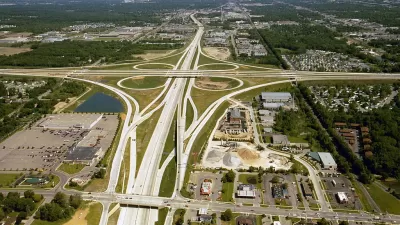A report from the Sabin Center provides a legal framework for municipal-level action on climate change policy.

The Sabin Center for Climate Change Law's Amy E. Turner and Michael Burger provide a legal framework for cities wanting to take action on climate change goals in their local jurisdictions. The document "is meant to highlight potential issues and offer a range of paths forward that cities may consider in pursuing their municipal carbon reduction goals."
Outlining the four sectors that contribute to greenhouse gas emissions––buildings, transportation, energy, and waste––the report explores carbon reduction policies that can be implemented at the municipal level and "cross-cutting legal frameworks that inform many areas of city climate policy, as well as legal concepts that influence how equity may be incorporated into those policy domains."
Potential decarbonization tools in the four sectors include:
- Buildings: building energy benchmarking, energy efficiency retrofits, changes in local building codes, restriction on energy sources.
- Transportation: land use and zoning reform, support of alternative transportation modes, congestion pricing, and investment in electric vehicle infrastructure.
- Energy: investment in renewable energy programs at the household level and the utility scale.
- Waste: recycling and organic waste collection programs, waste management requirements for new buildings, plastic bans, and regulation of waste companies.
The report also includes a chapter on equity, citing the impacts of climate change on BIPOC and low-income communities and the interwoven nature of decarbonization, housing, and jobs policies. While the authors note that all cities have different legal constraints, the framework can serve as an informational tool to guide city leaders towards the most effective decarbonization policies.
FULL STORY: Cities Climate Law: A Legal Framework for Local Action in the U.S.

Planetizen Federal Action Tracker
A weekly monitor of how Trump’s orders and actions are impacting planners and planning in America.

Maui's Vacation Rental Debate Turns Ugly
Verbal attacks, misinformation campaigns and fistfights plague a high-stakes debate to convert thousands of vacation rentals into long-term housing.

Restaurant Patios Were a Pandemic Win — Why Were They so Hard to Keep?
Social distancing requirements and changes in travel patterns prompted cities to pilot new uses for street and sidewalk space. Then it got complicated.

In California Battle of Housing vs. Environment, Housing Just Won
A new state law significantly limits the power of CEQA, an environmental review law that served as a powerful tool for blocking new development.

Boulder Eliminates Parking Minimums Citywide
Officials estimate the cost of building a single underground parking space at up to $100,000.

Orange County, Florida Adopts Largest US “Sprawl Repair” Code
The ‘Orange Code’ seeks to rectify decades of sprawl-inducing, car-oriented development.
Urban Design for Planners 1: Software Tools
This six-course series explores essential urban design concepts using open source software and equips planners with the tools they need to participate fully in the urban design process.
Planning for Universal Design
Learn the tools for implementing Universal Design in planning regulations.
Heyer Gruel & Associates PA
JM Goldson LLC
Custer County Colorado
City of Camden Redevelopment Agency
City of Astoria
Transportation Research & Education Center (TREC) at Portland State University
Jefferson Parish Government
Camden Redevelopment Agency
City of Claremont





























